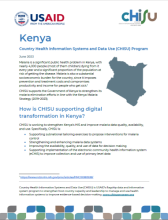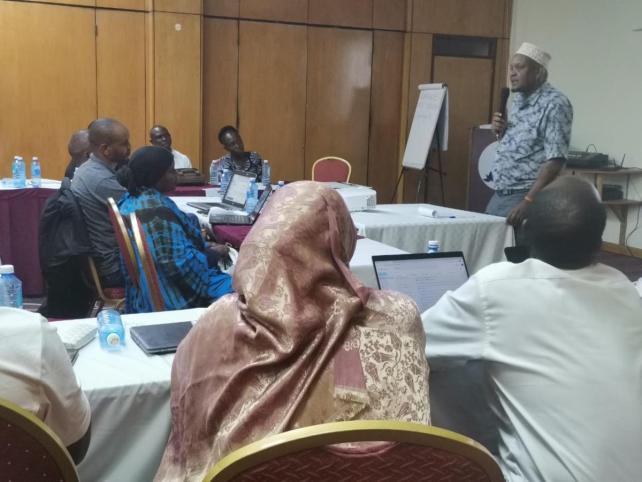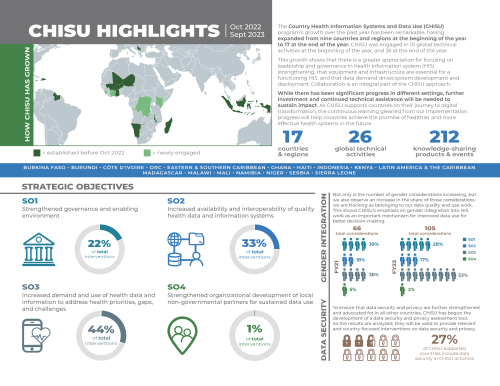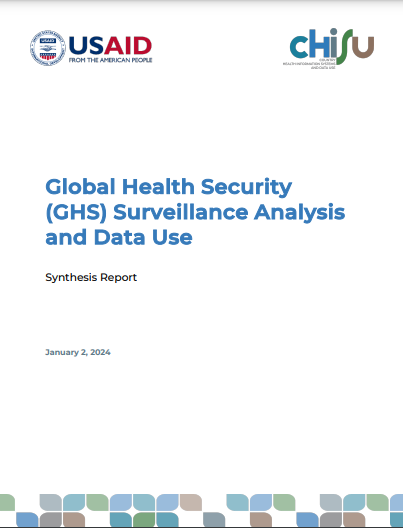Kenya
CHISU is working to strengthen Kenya’s HIS and improve malaria data quality, availability, and use. Specifically, CHISU is:
- Supporting subnational tailoring exercises to propose interventions for malaria control
- Strengthening and enhancing malaria data systems
- Improving the availability, quality, and use of data for decision making
- Supporting implementation of the electronic community health information system (eCHIS) to improve collection and use of primary level data
Supporting subnational intervention tailoring for malaria control
The current Kenya Malaria Strategy includes recommendations around strengthening the capturing and reporting of malaria data and using routine data to conduct regular data stratification. This stratification informs public health decision making in Kenya and allows the country to target their malaria approaches and interventions. To support these efforts, CHISU is providing technical and logistical support to Kenya’s Division of National Malaria Programme (DNMP) to engage technical experts and local stakeholders in building and calibrating a mathematical model to study malaria transmission dynamics locally. In addition, this collaboration with experts and stakeholders will allow for the proposal of a mix of interventions to predict disease outcomes (cases and prevalence). The final outputs of the model will recommend future interventions to be included in Kenya’s Global Fund Cycle 7 Grant Application.
Strengthening and enhancing malaria data systems and improving the availability, quality, and use of data for decision making
In Kenya, routine data is collected manually and on paper, and aggregated data is entered into the national HIS using the District Health Information Software 2 (DHIS2) platform at the subnational level to be analyzed at the national level. Routine data sources include household surveys (which are used to measure population-based coverage and examine changes in health outcomes), health facility surveys, and special assessments (which are used to evaluate questions related to quality of care, drug efficacy, and malaria diagnosis using laboratory testing).
Supporting eCHIS to improve collection and use of primary level data
To ensure community-level data is collected in an electronic format, Kenya’s Ministry of Health, in collaboration with Medic Mobile, developed the Electronic Community Health Information System (eCHIS) app (launching in June 2023). Kenya plans for a nationwide scale up of eCHIS by 2024–2025. CHISU will support scale-up and nationwide deployment of the app by providing national capacity building initiatives at both the national and county levels. CHISU will support the training of over 40 master trainers and over 300 national master trainers at the national level while also organizing training sessions for community health promoters and assistants in four counties: Trans Zoia, Turkana, Nakuru, and Tharaka Nithi. To ensure a standards-based approach is adopted across all active HIS, CHISU will also assess the data security, privacy, and interoperability of eCHIS and make recommendations.

Activity Updates
Strengthening data use for action against malaria in Kenya

In Kenya, we are supporting NMCP to improve the country’s governance by revising the national malaria policy and malaria strategic plan to reflect changes in program planning; strengthening systems to improve availability of malaria data; improving the quality and use of routine d Read more ›
Blog Posts
Improving Kenya’s malaria response by revising epidemic thresholds
Malaria is a significant public health problem in Kenya, with nearly 4,000 people (most of them children) dying from it every year—and a significant proportion of the population is at risk of getting the disease. CHISU worked with Kenya's National Malaria Control Program (NMCP) and the University of Nairobi Health-IT (funded by USAID) to revise the malaria epidemic thresholds used in the District Health Information System 2 (DHIS2) application. Read more ›
Resources

CHISU Highlights from October 2022–September 2023
The Country Health Information and Data Systems Use (CHISU) program experienced remarkable growth from October 2022–September 2023, expanding from nine countries and regions at the beginning of the year to 17 at the end of the year. CHISU was engaged in 10 global technical activities at the beginning of the year, and 26 at the end of the year.

Global Health Security (GHS) Surveillance Analysis and Data Use
This study assessed the gaps in the use of disease surveillance data for public health emergencies in Burkina Faso, Burundi, Ghana, Kenya, and Madagascar to identify opportunities for better integration of surveillance data with both routine health data and non-health data.